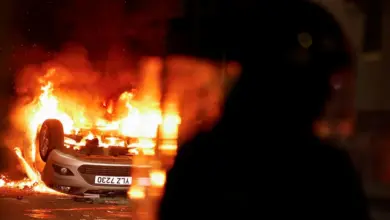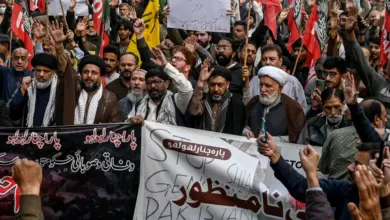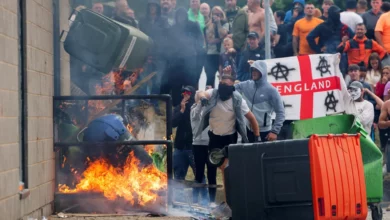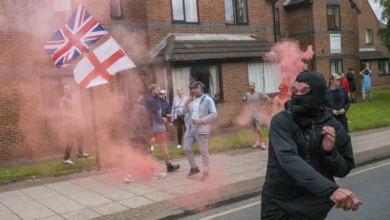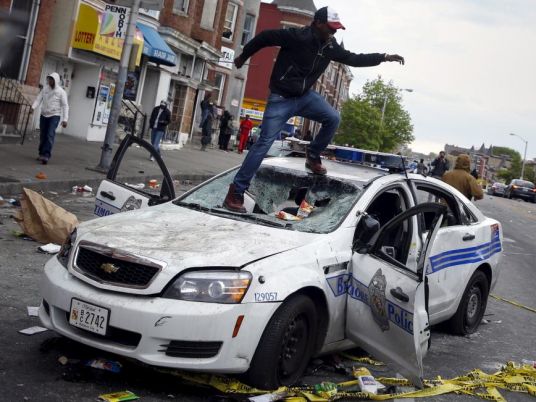
Baltimore erupted in violence on Monday as hundreds of rioters looted stores, burned buildings and at least 15 police officers were injured following the funeral of a 25-year-old black man who died after suffering a spinal injury in police custody.
The riots broke out blocks from where the funeral of Freddie Gray took place and spread through much of west Baltimore.
It was the most violent protest against police treatment of African Americans since arson and gunfire in Ferguson, Missouri, last year.
A state of emergency was declared by Maryland Governor Larry Hogan, a Republican, who sent in the National Guard, and a curfew was imposed in the majority black city from Tuesday night, with exceptions for work and medical emergencies.
Firefighters battled numerous blazes through Monday night, including one that consumed a church's senior center under construction in East Baltimore. Police said looting, fires and attacks against officers continued overnight.
Looters sacked liquor stores, pharmacies, a shopping mall and a check-cashing store. Rioters smashed car windows outside a major hotel and twice slashed a fire hose while firefighters fought a blaze at a CVS pharmacy that had been looted before it was set on fire.
"All this had to happen, people getting tired of the police killing the young black guys for no reason. … It is a sad day but it had to happen," said Tony Luster, 40, who was out on the street watching the police line.
Gray was arrested on April 12 when running from officers. He was transported to the police station in a van, with no seat restraint, and suffered the spinal injury that led to his death a week later. A lawyer for Gray's family says his spine was 80 percent severed at the neck while in custody.
Six officers have been suspended, and the US Justice Department is investigating the incident for possible civil rights violations.
Gray's death reignited a public outcry over police treatment of African Americans that flared last year after police killings of unarmed black men in Ferguson, New York City and elsewhere.
But after several days of peaceful protests, events turned violent on Monday. Democratic Mayor Stephanie Rawlings-Blake called the looters "thugs" and said they had nothing to do with protests.
Police made at least 27 arrests and Baltimore schools will be shut Tuesday. An Orioles baseball game was canceled and businesses and train stations shut down in the city of 620,000 people 40 miles (64 km) from the nation's capital.
Baltimore a troubled city
Much of the rioting occurred in a neighborhood where more than a third of families live in poverty. The violence appeared to catch city officials somewhat off-guard after a week of peaceful protests.
After Missouri was criticized for a heavy-handed response to protests over the police killing of unarmed black teenager Michael Brown in August, cities have carefully tread a line between allowing peaceful demonstrations over police brutality and preventing violence.
Answering criticism of not responding quickly enough to Monday's events, Mayor Rawlings-Blake told CNN: "This was an incident that sparked this afternoon … I think it would have been inappropriate to bring in the National Guard when we had it under control."
Gray's family pleaded for peaceful demonstrations and after the looting started, pastors and community leaders took to the streets to try to prevent violent clashes between black youth and police.
Looters were nonchalant and showed their faces.
"We went in there and tore it up," said a 16-year-old who said he was one of the looters inside the CVS.
Just down the street from the smoldering CVS, business owner Daisy Bush, 61, said: "The sad part about it is that a lot of people from the community were up there in the CVS, stealing stuff out of it. It's a disgrace."
Earlier in the day youths threw rocks and bricks at police. Six officers were injured seriously, Baltimore Police Commissioner Anthony Batts told reporters.
"This is not protesting. This is not your first amendment rights. This is just criminal acts doing damage to a community," he said.
Baltimore has long struggled with high crime and gangs, a reputation that has made it the setting for gritty television police dramas such as "The Wire."
At Gray's funeral, speaker after speaker before the crowd packing the 2,500-seat New Shiloh Baptist Church said the world was watching to see if justice would be done for Gray.
A string of deadly confrontations between mostly white police and black men, and the violence it has prompted, will be among the challenges facing US Attorney General Loretta Lynch, who was sworn in on Monday.
Lynch condemned the "senseless acts of violence" and signaled that improving relations between the police and the communities they protect will be high on her agenda.
Riots over race issues and police brutality have gripped US cities in the past.
In the 1992 Los Angeles riots, more than 50 people were killed in violence set off by the acquittal of four police officers who beat black motorist Rodney King. In 1968, dozens died in riots, including several in Baltimore, after the assassination of civil rights leader Martin Luther King Jr.

